|
The cream gene causes red to become gold, but
does not affect black pigment EXCEPT when in a double dose (smokey cream
and perlino) where black becomes light taupe. So a seemingly regular
"black" horse, if it were truly a smokey black,
could throw a "surprise" cream gene, while a red horse could never carry
the cream gene without showing it.
Much
like pouring milk into coffee, the more cream, the lighter the color.
Where one cream gene lightens red to gold, two cream genes turns red to
white. Horses with one cream gene often have light brown to golden eyes.
Horses with two cream genes have light blue eyes.
Cream Color Recipes
*Double
agouti cream dilutes are desirable, as they can't produce the less
desirable smokey blacks or smokey creams.
|
A palomino is a chestnut horse
with one cream gene. It may carry the agouti, but won't
show it. They have golden bodies with a white mane and
tail. The "golden" bodies range from pale cream, to true
gold, to butterscotch or dark chocolate (usually "sooty".)
Many palominos have light brown or golden eyes.
A palomino is capable of producing
chestnut, palomino, black and smoky blacks when bred to
horses that do not carry the cream gene (chestnut, bay,
and black). If the palomino or other parent carries the
agouti gene, they could produce
a bay or buckskin. Palominos that are homozygous for the
agouti will never produce black, smokey black or smokey
cream foals.
Palominos will have one of the
following genotypes:
-
ee aa NCr
-
ee Aa NCr
-
ee AA NCr
|

Pippi White Stockings (ee AA NCr) our palomino TWH mare. |
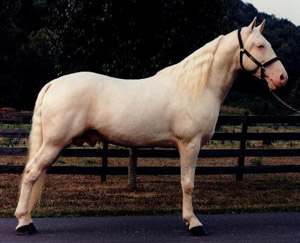
Royal Ivory (ee aa CrCr). One
of the most prolific cremello walking horse stallions of
all times. He was a 16h gentle giant owned by Kenny Gilley
until his death. |
A cremello is a chestnut horse
with two cream genes. It may carry the agouti, but won't
show it. Cremellos are solid white with light blue eyes.
A cremello will only produce
palomino and smokey black when bred to horses that do not
carry the cream gene (chestnut, bay, and black). If the
cremello or other parent carries the
agouti gene, they could produce a buckskin. Cremellos
that are homozygous for the agouti will never produce
smokey black or smokey cream foals.
Cremellos will have one of the
following genotypes:
-
ee aa CrCr
-
ee Aa CrCr
-
ee AA CrCr
|
|
A buckskin is a bay horse that
with one cream gene. They have golden bodies with black
points. The "golden" bodies range from pale cream, to true
gold, to butterscotch or dark chocolate (usually "sooty".)
Many buckskins have light brown or golden eyes.
A buckskin is capable of producing
bay, buckskin, chestnut, palomino, black and smoky blacks
when bred to horses that do not carry the cream gene
(chestnut, bay, and black). Buckskins that are homozygous
for the agouti will never produce black, smokey black or
smokey cream foals.
Smokey Blacks will have one of the
following genotypes:
|
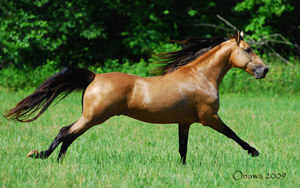
Golden Gambler(EeAANCr) our
buckskin TWH stallion. Proven sire of champions on the
rail and trail. |
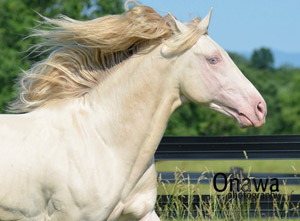
Gambler's Midas Touch WF (Ee AA
CrCr), our perlino TWH stallion. Notice the difference in
color between his body and mane. He will only produce
palomino or buckskin bred to any bay, black or chestnut
mare. |
A perlino is a bay horse that with
two cream genes. They look very similar to cremellos,
except that their points are just slightly darker.
Perlinos have the same light blue eyes.
A perlino will only produce
palomino, buckskin and smokey black when bred to horses
that do not carry the cream gene (chestnut, bay, and
black). Perlinos that are homozygous for the agouti will
never produce smokey black or smokey cream foals.The best
way to determine if a horse a perlino is to have it
color tested.
Smokey Creams will have one of the
following genotypes:
|
|
A smokey black is a black horse
that with one cream gene. They do not carry the agouti
(they are "aa.") They look like a regular or sunbleached
black horse sometimes with light brown or golden eyes.
A smokey black is capable of
producing chestnut, palomino, black and smoky blacks when
bred to horses that do not carry the cream gene (chestnut,
bay, and black). If the other parent carries the
agouti gene, a smokey black
could produce a bay or buckskin. The best way to determine
if a horse a smoky black is to have it
color tested.
Smokey Blacks will have one of the
following genotypes:
|
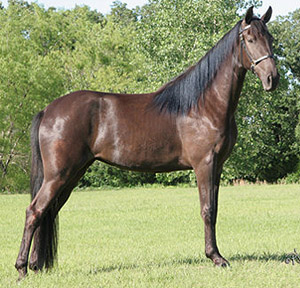
Lady Sheba is owned by A Walking Horse Ranch. You can see
more pictures of her and the foals she has produced at
www.awalkinghorseranch.com. |
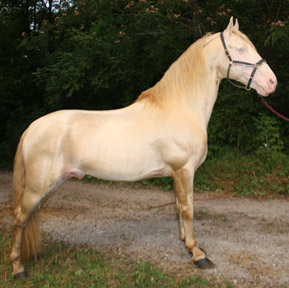
Gen's Ivory Bandit, a fine example of a smokey cream.
He is a TWH stallion owned by Walkin on the Ridge. |
A smokey cream is a black horse
that with two cream genes. They look very similar to
cremellos and perlinos, except that their body is just
slightly darker all over where a perlino had darker points
and a cremello is solid white. Smokey creams have the same
light blue eyes.
A smokey cream will only produce
palominos and smokey blacks when bred to horses that do
not carry the cream gene (chestnut, bay, and black). If
the other parent carries the agouti
gene, a smokey cream could produce a buckskin. The
best way to determine if a horse a smoky cream is to have
it color tested.
Smokey Creams will have one of the
following genotypes:
|
Myth#1:
"has # palominos/creams in his/her background, so will produce
color!"
One thing that I see advertised over and over
again is "This horse should be an excellent color producer since she/he
has lots of palominos/champagnes in her/his background." Now, it is a
great thing to be able to trace the color all the way through the pedigree
(especially since bloodtyping didn't come into effect until the 1990's).
However, just because the horse has a large number of creme/champagne
horses in its pedigree, DOES NOT mean it is any more likely to produce
cream. Whether the horse has a single line of cream,
or ALL of its ancestors were cream, a single dilute in cream
(palomino, buckskin, smokey black) has the same 50% chance of throwing the
gene as any other single dilute.
SUMMARY: The number of cream horses in a horse's pedigree means
NOTHING.
Myth #2: "dark/light palominos produce a
higher percentage of palomino than light/dark"
Because of personal experience, many breeders
believe that a particular shade of palomino, champagne, etc. is more
likely to produce a dilute than another shade. However, the gene that is
responsible for the shade of the coat (dark palomino vs. light palomino)
is a separate, distinct gene. It does not increase or decrease the
possibility of throwing a light or dark dilute. Since many people prefer a
dark palomino to a light one, I will say that your best bet for producing
that dark palomino is crossing a deep red chestnut to a cremello.
Likewise, red-bays produce the deep gold colored buckskins.
|

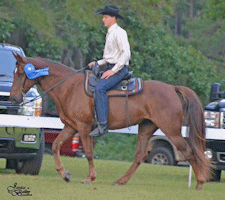 chestnut
chestnut






 smokey
cream
smokey
cream